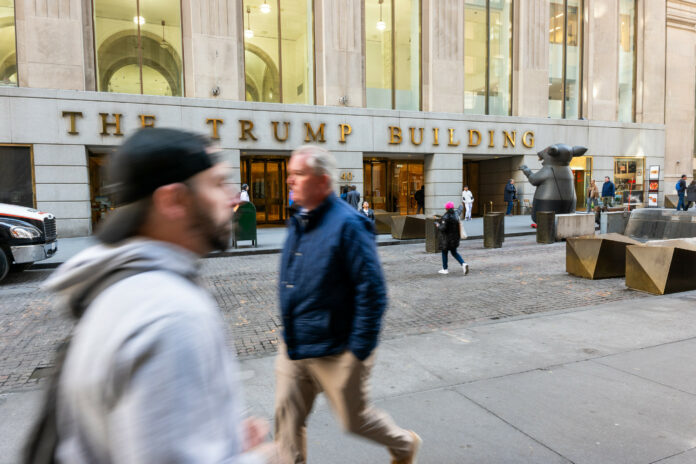The New York Attorney General Letitia James could start to confiscate Donald Trump’s properties as soon as Tuesday if he fails to make a £464 million civil-fraud case bond payment, and experts say the move could spark apprehension in the real-estate market.
Some real-estate experts say that the potential seizure of Trump’s properties by authorities could provide some clarity on how much properties offloaded quickly would fetch in the New York commercial real-estate market.
In February, the judge overseeing the case, Justice Arthur Engoron, ordered Trump to pay $355 million, which has increased to $464 million with interest, for inflating the value of his assets to obtain more favorable terms from banks and insurers. He also banned him from serving in top roles in any New York business for three years. Trump has repeatedly denied any wrongdoing in the civil-fraud case and insists that, if anything, his assets were undervalued.
“The most likely impact is that we get to see how much you can get for a property if you have to sell it in a hurry,” Stijn Van Nieuwerburgh, a professor of real estate at Columbia University’s Graduate School of Business, told Newsweek.
“We get to see an important transaction, and there’s some price discovery that comes with that transaction. But I don’t think, beyond that, this is not going to make or break the overall commercial real-estate market.”
Newsweek has contacted the office of New York attorney general and Trump’s campaign for comment via email on Thursday.
Legal experts point out that, even if James were to take Trump’s assets next week, she may pause on what to do with them to allow for the appeals process to exhaust itself.
“I think the most likely outcome is that even if James seizes Trump’s properties, her office effectively won’t do anything with them,” Will Thomas, assistant professor of business law at the University of Michigan, told Newsweek. “They’ll let them continue running as they exist today. It’s not like she’s going to put them up for sale immediately, I don’t suspect.”
Thomas added that the long-term impact of the potential move to take over the Trump properties could be harder to predict.
“One possible outcome that people have raised is real estate developers are going to get nervous about the same thing happening to them,” Thomas said.
Thomas, however, added that the Trump case was quite specific and may not apply to the larger real-estate market in New York.
The takeover of the specific Trump properties may not have a significant material impact as they represent a relatively small part of the larger New York real-estate market, according to Massimo D’Angelo, a real-estate lawyer at Blank Rome.
“Broadly speaking, no, because we are talking about too little properties, right?” D’Angelo told Newsweek. “I mean if it was more expansive or there were more buildings and properties involved, then there might be some sort of an impact on the overall real estate market.”
This perspective was echoed by Norm Miller, a real-estate economist and emeritus professor at the University of San Diego.
“It’ll be very minor because he doesn’t own enough in New York to have a significant impact. And I mean the large, the large, properties tend to trade among institutional investors, and this is not, it’s not enough to move the needle,” Miller told Newsweek.
Spencer Platt/Getty Images
But the move could create some anxiety among some in the sector going forward, according to D’Angelo. For those who for some reason fail to meet a bond requirement, they may now fear that they could lose their properties.
“With respect particularly to the real-estate industry, if this statute is used in these kinds of cases against other players going forward then it absolutely will have a severe and dramatic impact on the New York real estate market,” D’Angelo said. “If other folks are in the same position, in other words, not being able to come up with a bond or, make good on a payment, then those properties would also be lost.”
Some financial analysts say the case may change the way investors think of New York.
“You can’t be a real-estate investor in [New York City] watching what is going on and having a good feeling about being an investor there,” Matthew Tuttle, CEO of Tuttle Capital Management, told Newsweek. “Everyone trying to get a loan is going to inflate the value as much as a bank will let them get away with.”
Tuttle added: “If this is something that is going to now be enforced and prosecuted, I think there are other places to invest that are more investor friendly.”
If Trump isn’t able to offer a financial guarantee by next Monday, the state’s attorney general would be allowed to start collecting on the money the former president owes the state as the result of James’ lawsuit.
In a court filing on March 18, Trump’s legal team said it was “practically impossible” for him to post the $464 million bond and suggested it be reduced to $100 million.
“Despite scouring the market we have been unsuccessful in our effort to obtain a bond for the Judgment Amount for Defendants for the simple reason that obtaining an appeal bond for $464 million is a practical impossibility under the circumstances presented,” the filing said.
Uncommon Knowledge
Newsweek is committed to challenging conventional wisdom and finding connections in the search for common ground.
Newsweek is committed to challenging conventional wisdom and finding connections in the search for common ground.


